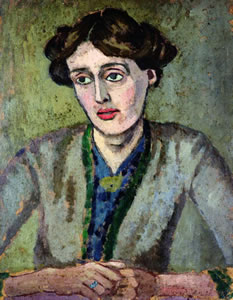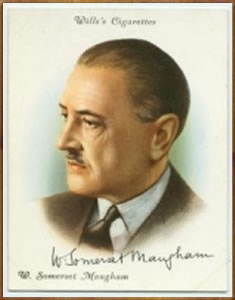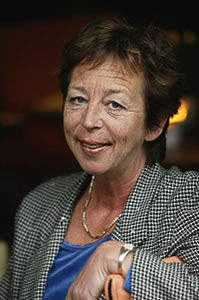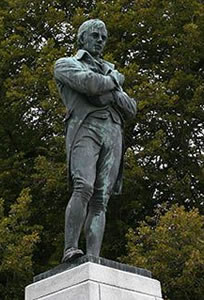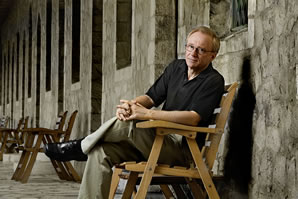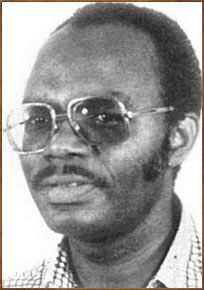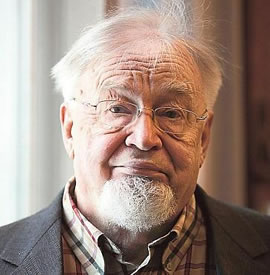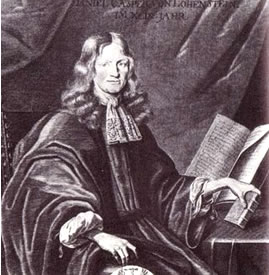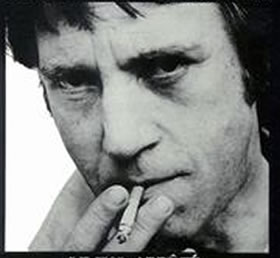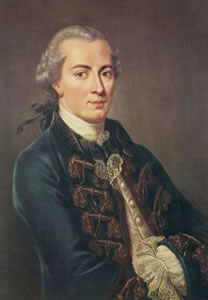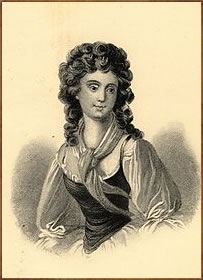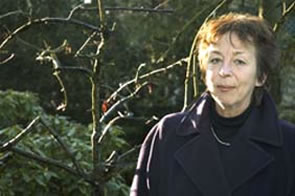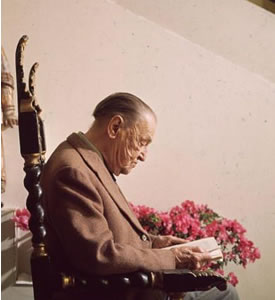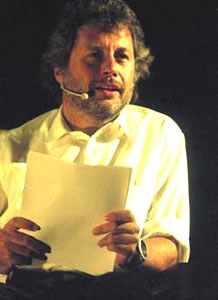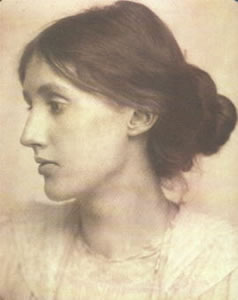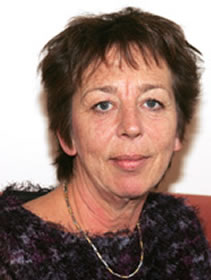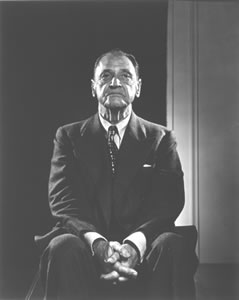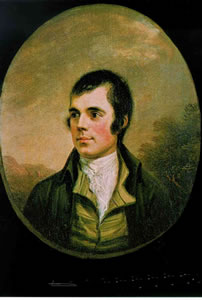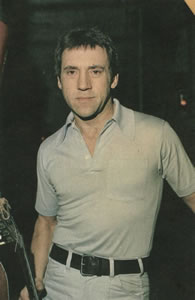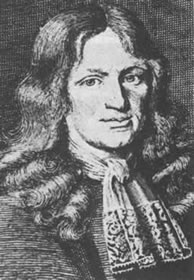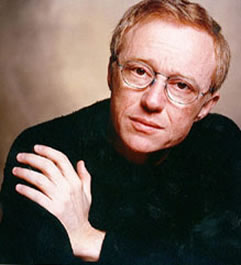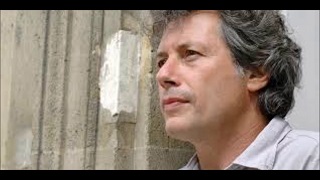De Engelse schrijfster Virginia Woolf werd geboren op 25 januari 1882 te Londen. Zie ook mijn blog van 25 januari 2007 en ook mijn blog van 25 januari 2008 en ook mijn blog van 25 januari 2009.
Uit: The Diary of Virginia Woolf
„Tuesday 13 September 1938
No war yet anyhow. Hitler boasted & boomed but shot no solid bolt. Mere violent rant, & then broke off. We listened in to the end. A savage howl like a person excruciated; then howls from the audience; then a more spaced & measured sentence. Then another bark. Cheering ruled by a stick. Frightening to think of the faces. & the voice was frightening. But as it went on we said (only picking a word or two) anti-climax. This seems to be the general verdict. He darent cross the line. Comes up to it & stands bawling insults. Times very scathing & sarcastic. How can people stand this nonsense? Negotiations to go on, under threat that he will use force if &c.
An evening with T. S. Eliot. Monday 19 December 1938
The last dinner of the year was to Tom Eliot last night. Physically he is a little muffin faced; sallow & shadowed; but intent (as I am) on the art of writing. His play – Family Reunion? – was the staple of the very bitter cold evening. (The snow is now falling: flakes come through my skylight: I am huddled in my red rain jacket, opportunely given by L.) It has taken him off & on 2 years to write, is an advance upon Murder; in poetry; a new line, with 3 stresses; ”I dont seem popular this evening”: ”What for do we talk of cancer again” (no: this is not accurate). When the crisis came, his only thought was annoyance that now his play would not be acted.
Tom said the young don’t take art or politics seriously enough. Disappointed in the Auden- Ish(erwoo)d. He has his grandeur. He said that there are flaws in the new play that are congenital, inalterable. I suspect in the department of humour. He defined the different kinds of influence: a subtle, splitting mind: a man of simple integrity, & the artists ingenuous egotism. Dines out & goes to musical teas; reads poems at Londonderry house; has a humorous sardonic gift which mitigates his egotism; & is on the side of authority. A nice old friends evening.
Sunday 29 January 1939
Yes, Barcelona has fallen: Hitler speaks tomorrow; the next dress rehearsal begins: I have seen Marie Stopes, Princesse de Polignac, Philip & Pippin, & Dr Freud in the last 3 days, also had Tom to dinner & to the Stephens’ party.
Dr Freud gave me a narcissus. Was sitting in a great library with little statues at a large scrupulously tidy shiny table. We like patients on chairs. A screwed up shrunk very old man: with a monkeys light eyes, paralysed spasmodic movements, inarticulate: but alert. On Hitler. Generation before the poison will be worked out. About his books. Fame? I was infamous rather than famous. didnt make $:50 by his first book. Difficult talk. An interview. Daughter & Martin helped. Immense potential, I mean an old fire now flickering. When we left he took up the stand What are you going to do? The English – war.“

Virginia Woolf (25 januari 1882 – 28 maart 1941)
De Engelse schrijver William Somerset Maugham werd geboren in Parijs op 25 januari 1874. Zie ook mijn blog van 25 januari 2007 en ook mijn blog van 25 januari 2008 en ook mijn blog van 25 januari 2009.
Uit: The Painted Veil
„She gave a startled cry.
“What’s the matter?” he asked.
Notwithstanding the darkness of the shuttered room he saw her face on a sudden distraught with terror.
“Some one just tried the door.”
“Well, perhaps it was the amah, or one of the boys.”
“They never come at this time. They know I always sleep after tiffin.”
“Who else could it be?”
“Walter,” she whispered, her lips trembling.
She pointed to his shoes. He tried to put them on, but his nervousness, for her alarm was affecting him, made him clumsy, and besides, they were on the tight side. With a faint gasp of impatience she gave him a shoe horn. She slipped into a kimono and in her bare feet went over to her dressing-table. Her hair was shingled and with a comb she had repaired its disorder before he had laced his second shoe. She handed him his coat.
“How shall I get out?”
“You’d better wait a bit. I’ll look out and see that it’s all right.”
“It can’t possibly be Walter. He doesn’t leave the laboratory till five.”
“Who is it then?”
They spoke in whispers now. She was quaking. It occurred to him that in an emergency she would lose her head and on a sudden he felt angry with her. If it wasn’t safe why the devil had she said it was? She caught her breath and put her hand on his arm. He followed the direction of her glance. They stood facing the windows that led out on the verandah. They were shuttered and the shutters were bolted. They saw the white china knob of the handle slowly turn. They had heard no one walk along the verandah. It was terrifying to see that silent motion. A minute passed and there was no sound. Then, with the ghastliness of the supernatural, in the same stealthy, noiseless, and horrifying manner, they saw the white china knob of the handle at the other window turn also. It was so frightening that Kitty, her nerves failing her, opened her mouth to scream; but, seeing what she was going to do, he swiftly put his hand over it and her cry was smothered in his fingers.
Silence. She leaned against him, her knees shaking, and he was afraid she would faint. Frowning, his jaw set, he carried her to the bed and sat her down upon it. She was as white as the sheet and notwithstanding his tan his cheeks were pale too. He stood by her side looking with fascinated gaze at the china knob. They did not speak. Then he saw that she was crying.
“For God’s sake don’t do that,” he whispered irritably. “If we’re in for it we’re in for it. We shall just have to brazen it out.”
She looked for her handkerchief and knowing what she wanted he gave her her bag.“
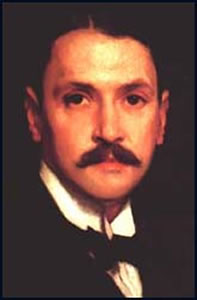
William Somerset Maugham (25 januari 1874 – 16 december 1965)
De Nederlandse schrijfster Renate Dorrestein werd geboren in Amsterdam op 25 januari 1954. Zie ook mijn blog van 25 januari 2007en ook mijn blog van 25 januari 2008 en ook mijn blog van 25 januari 2009.
Uit: Hollands Dagboek
„Donderdag 24 juli (2008)
Mijn nieuwe boek is in het stadium van de zaag en de bijl beland. Het vergde even een geestelijke aanloop, maar gepriegel zal echt niet meer baten, het betere hakwerk is nu vereist. Gewoon met deel één beginnen, en dan zien we wel waar het schip strandt. Tijdens het radbraken en vierendelen spreek ik de patiënt sussend toe. Het is voor je eigen bestwil, boek. Jij hebt zeven maanden je zin gekregen, nu is je moeder aan zet. En iedere scène die wordt gesloopt, blijft toch wel op de een of andere geheimzinnige manier doorklinken in het geheel. We zetten er iets in, we halen het er weer uit, maar weg raakt het nooit helemaal. Idioot werk, een boek schrijven, ik snap er niets van.
Sproei ’s avonds mijn verflenste tuin en maak nog een strandwandeling. Lees in bed The stone gods van Jeanette Winterson uit. Kan vervolgens niet slapen van verontwaardiging. Wat een mallotig, obscurantistisch verhaal, en dat van een van mijn favoriete auteurs.
Vrijdag 25 juli
Blijk eigenlijk maar één jurk te hebben die bestand is tegen een hittegolf, dus doe die weer aan. Verder business as usual: probeer me aan de sloop en wederopbouw van mijn boek te wijden, maar word in beslag genomen door andere dingen. Sleutel per mail samen met Kirsten van Uitgeverij Contact aan het juryrapport van de korte verhalenwedstrijd ter gelegenheid van het 75-jarige jubileum van de uitgeverij. Van de bijna achthonderd inzendingen zijn er nu nog elf over. Op 18 augustus zal ik als jurywoordvoerder drie mensen gelukkig kunnen maken, die mogen door naar de finale. De overige acht zal ik voorhouden dat ook ik jarenlang miskend ben geweest. Ieder woord in het juryrapport wordt op een goudschaaltje gewogen.
Maarten is er ’s avonds al bijtijds. Niet samenwonen heeft als voordeel dat er nooit gekissebis is over wie wat moet doen: wij doen uitsluitend iets in ons eigen huis. Dus leest Maarten in de keuken aan het aanrecht de krant, terwijl ik kook. Koken betekent bij mij: pakjes openmaken en de inhoud leuk in schaaltjes doen. Ik ben een mono-talent. De tafel is gedekt als onze gasten arriveren.“
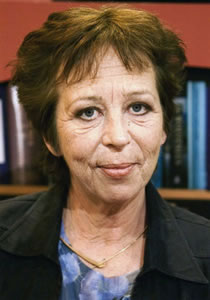
Renate Dorrestein (Amsterdam, 25 januari 1954)
De Amerikaanse schrijver en regisseur Stephen Chbosky werd geboren op 25 januari 1970 in Pittsburgh, Pennsylvania. Hij studeerde af aan de University of Southern California’s Filmic Writing Program. Zijn eerste film The Four Corners of Nowhere werd gepresenteerd tijdens het 1995 Sundance Film Festival en won de Best Narrative Feature honors tijdens het Chicago Underground Film Festival. Grote bekendheid verwierf hij met zijn briefroman The Perks of Being a Wallflower over een opgroeiende vijftien-jarige jongen.
Uit: The Perks of Being a Wallflower
„August 25, 1991
Dear friend,
I am writing to you because she said you listen and understand and didn’t try to sleep with that person at that party even though you could have. Please don’t try to figure out who she is because then you might figure out who I am, and I really don’t want you to do that. I will call people by different names or generic names because I don’t want you to find me. I didn’t enclose a return address for the same reason. I mean nothing bad by this. Honest.
I just need to know that someone out there listens and understands and doesn’t try to sleep with people even if they could have. I need to know that these people exist.
I think you of all people would understand that because I think you of all people are alive and appreciate what that means. At least I hope you do because other people look to you for strength and friendship and it’s that simple. At least that’s what I’ve heard.
So, this is my life. And I want you to know that I am both happy and sad and I’m still trying to figure out how that could be.
I try to think of my family as a reason for me being this way, especially after my friend Michael stopped going to school one day last spring and we heard Mr. Vaughn’s voice on the loudspeaker.
“Boys and girls, I regret to inform you that one of our students has passed on. We will hold a memorial service for Michael Dobson during assembly this Friday.”
I don’t know how news travels around school and why it is very often right. Maybe it was in the lunchroom. It’s hard to remember. But Dave with the awkward glasses told us that Michael killed himself. His mom played bridge with one of Michael’s neighbors and they heardthe gunshot.
I don’t really remember much of what happened after that except that my older brother came to Mr. Vaughn’s office in my middle school and told me to stop crying. Then, he put his arm on my shoulder and told me to get it out of my system before Dad came home.“

De Iers-Britrse schrijver James Gordon Farrell werd geboren op 25 januari 1935 in Liverpool. Midden jaren vijftig reisde hij naar Canada waar hij allerlei beroepen uitoefende. Na zijn terugkeer studeerde hij rechten in Oxford. Hij was op de universiteit een gedreven sporter, maar hij kreeg kinderverlamming. Van de gevolgen van deze ziekte bleef hij zijn leven lang last hebben. Farrell studeerde eveneens Spaans en Frans en werkte twee jaar in Frankfrijk als leraar talen. Zijn eerste boek A Man From Elsewhere verscheen in 1963. Zijn hoofdwerk is de Empire Trilogy waarin hij schtijft over het verval van het Britse rijk. De trilogie bestaat uit Troubles (1970) over de onlusten in Ierland, The Siege of Krishnapur (1973) over India en The Singapore Grip (1978) over de val van Singapur tijdens WO II. Voor The Siege of Krishnapur kreeg hij de Booker Prize. In maart 1979 verhuisde hij naar het schiereiland Sheep’s Head in Ierland. Op 11 of 12 augustus verdronk hij daar tijdens het vissen. In 1988 werd Troubles door Christopher Morahan verfilmd.
Uit: The Siege of Krishnapur
“For several nights the Collector had stayed up until dawn reading his military manuals by the light of an oil-lamp in his study to instruct himself in the art of military mining…What an advantage that knowledge can be stored in books! The knowledge lies there like hermetically sealed provisions waiting for the day when you may need a meal. Surely what the collector was doing as he pored over his military manuals , was proving the superiority of the European way of doing things, of European culture itself. This was a culture so flexible that whatever he needed was there in a book at his elbow. An ordinary sort of man, he could, with the help of an oil-lamp, turn himself into a great military engineer, a bishop, an explorer or a General overnight, if the fancy took him. As the collector pored over his manuals, from time to time rubbing his tired eyes, he knew that he was using science and progress to help him out of his difficulties and he was pleased…”
(…)
„Later, while he was drinking tea at the table in his bedroom with three young subalterns from Captainganj a succession of musket balls came through the winder, attracted by the oil-lamp . . . one, two, three and then a fourth, one after another. The officers dived smartly under the table, leaving the Collector to drink his tea alone. After a while they re-emerged smiling sheepishly, deeply impressed by the Collector’s sang-froid. Realizing that he had forgotten to sweeten his tea, the Collector dipped a teaspoon into the sugar-bowl. But then he found that he was unable to keep the sugar on the spoon: as quickly as he scooped it up, it danced off again. It was clear that he would never get it from the sugar-bowl to the cup without scattering it over the table, so in the end he was obliged to push the sugar away and drink his tea unsweetened.“

J. G. Farrell (25 januari 1935 – 11 augustus 1979)
Voor nog meer schrijvers van de 25e januari zie ook mijn twee vorige blogs van vandaag.

